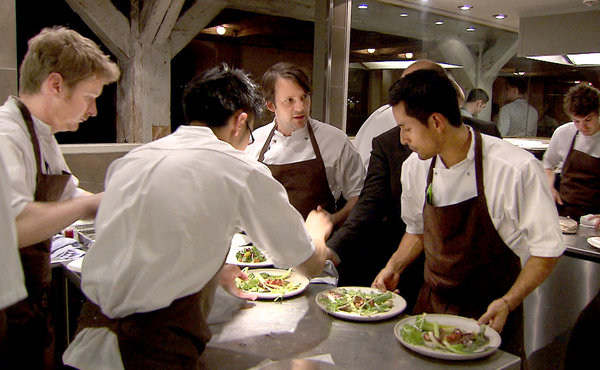by Fabio Parasecoli
from Huffington Post
The release of Lutz Hachmeister’s documentary Three Stars confirms what I suggested a few weeks ago on this blog: the love story between media and cooking has found yet another outlet, and one that can claim very respectable origins. After cookbooks, TV shows, the Internet and social media, celebrity chefs are becoming a staple on the silver screen — and not only as mercurial, intriguing, foulmouthed and unnerving protagonists of fiction movies. Big-name restaurants have acquired enough cachet, and can command large enough audiences, that documentary makers have also turned their cameras on them. We might be witnessing the rise of a new sub-genre in the already popular category of food-centered documentaries, although less politically engaged and polemical.
Three Stars tries to go beyond the glitter and the celebrity factor that seems to dominate much of the media discourse around chefs. Though interviews and footage of famous chefs occupy most of the screen time in Hachmeister’s film, his main focus is the industry itself, in its business aspects and its complicated relationship with critics. The entry point for Hachmeister is the Michelin guide system, which since 1932 has reviewed and starred restaurants, first in France and then an ever-growing list of global cities. In the past few years, the release of the out-of-France Michelin guidebooks has unleashed widespread criticism against what many interpret as gastronomic imperialism aimed to impose French haute cuisine standards, principles and priorities to the rest of the world. The expansion of Michelin, still largely perceived as a French institution, may appear anachronistic at a time when other culinary traditions, like those from Japan and Italy, are achieving global recognition as worthy of high-end establishments.
Three Stars tries to unpack what hides behind the Michelin phenomenon by following nine restaurateurs in seven countries. The narrative cannot avoid addressing the tragic death of Bernard Loiseau in 2003, widely reported as a consequence of his losing his third star, but the filmmaker looks beyond this to understand what makes the whole system thrive and why chefs all over the world play along with it. Some of chefs, although critical of the guide system, admit that the Michelin star has an impact on their future and fame, although it does not automatically mean a profitable business. Questions of logistics, labor and ingredient expenses emerge as urgent issues for the restaurant owners, who also discuss their own take on the Michelin system and their personal choices regarding it. René Redzepi from Denmark, considered one of the most innovative and interesting chefs in the world, evaluates his two stars and its impact, while French chef Olivier Roellinger explains why he closed his very successful restaurant after achieving his third star to open a hotel. Other questions are not addressed. For instance, why is there only one woman, the very talented and gentle Nadia Santini from Italy, among the protagonists of the movie?
Although Three Stars features many gorgeous shots of fantastic dishes, luscious produce and intriguing hand, Lutz Hachmeister does not embrace the use of food-porn aesthetics for the food porn’s sake. The guidebook system and the chefs that gain or are damaged by it, rather than the plates they prepare, remain the central elements of Hachmeister’s curious gaze. This approach makes the documentary very informative, especially for those who are curious about the glitzy world of exclusive restaurants, but are not too familiar with their inner workings.
Overall, the desire to reflect as many points of view as possible from very diverse chefs, across very distinctive establishments in very dissimilar culinary cultures, dilutes the documentary’s impact. Furthermore, in an attempt to focus the viewer’s attention on the main topic, Hachmeister also interviews Jean Luc Naret, the previous directeur général of the Michelin Guides. Since the filming, Naret has been replaced by Michael Ellis, a manager more closely connected to tire production, conceivably instructed to manage the increasing losses incurred by the books. This change at the helm of the Michelin guides may suggest a revision in the overall strategy of the company, and we wonder how the whole system will develop in the future.


Comments are closed.